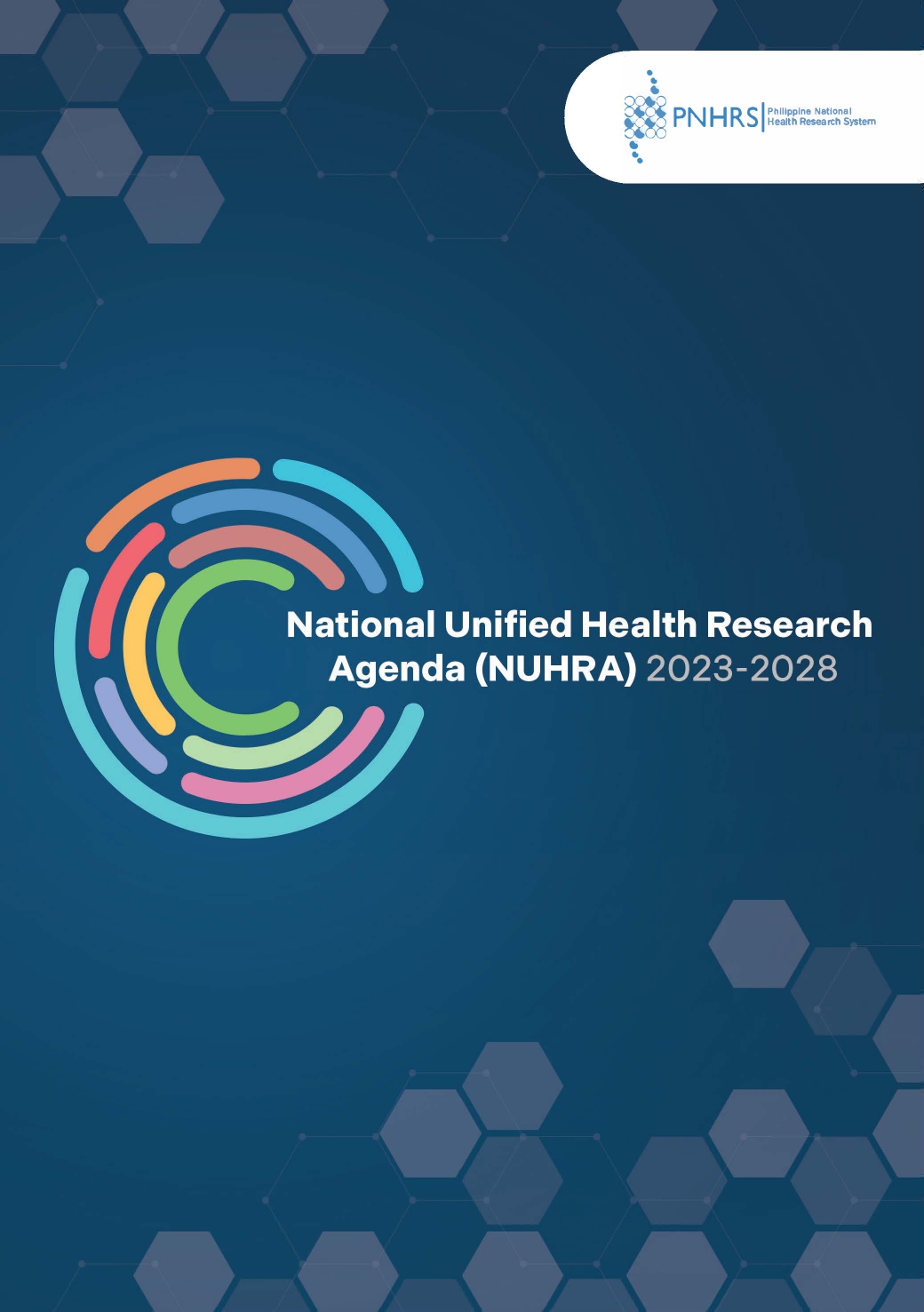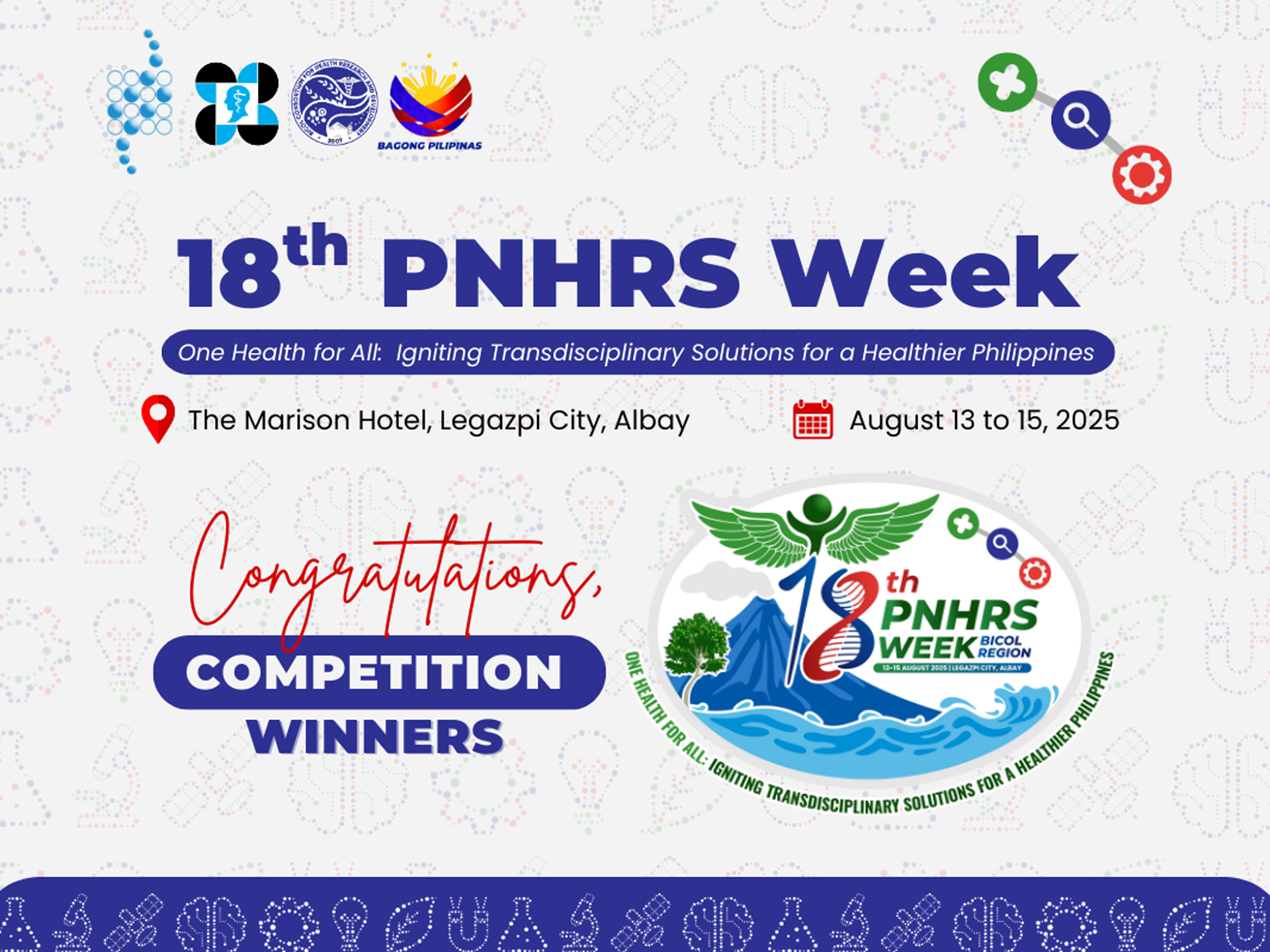Republic of the Philippines
Congress of the Philippines
Metro Manila
Fifteenth Congress
Third Regular Session
Begun and held in Metro Manila, on Monday, the twenty-third day of July, two thousand twelve.
[REPUBLIC ACT NO. 10532]
AN ACT INSTITUTIONALIZING THE PHILIPPINE NATIONAL HEALTH RESEARCH SYSTEM
Be it enacted by the Senate and House of Representatives of the Philippines in Congress assembled:
ARTICLE I
GENERAL PROVISIONS
SECTION 1. Short Title. – This Act shall be known as the “Philippine National Health Research System Act of 2013”.
SEC. 2. Declaration of Policy. – It is hereby declared the policy of the State to protect and promote the right to health of the people, instill health consciousness among them and improve the quality of life of every Filipino through health research and development initiatives.
SEC. 3. Definition of Terms. – For the purpose of this Act, the following terms shall be defined as follows:
(a) Health shall refer to a state of optimal physical, mental and social well-being and the ability to function at the individual level.
(b) Health Research Stakeholders shall refer to the national and the local public and private agencies/organizations, policymakers, the academe, medical and health societies, people’s organizations and others who are concerned with and affected by health and development.
(c) National Unified Health Research Agenda shall refer to a set of research priorities determined by the country’s stakeholders which addresses the health needs of the population vis-a-vis the health sector’s goal for universal health care. This agenda is a platform to advocate for local, national and international support.
(d) Philippine Council for Health Research and Development (PCHRD) shall refer to one of the sectoral planning councils of the Department of Science and Technology (DOST) which provides central direction, leadership and coordination in health science and technology (S&T).
(e) Philippine Health Research Ethics Board (PHREB) shall refer to the national policymaking body on health research ethics, created under DOST Special Order No. 091, which is mandated to ensure that all phases of health research shall adhere to the universal ethical principles that value the protection and promotion of the dignity of health research participants.
(f) Philippine National Health Research System (PNHRS) shall refer to a framework anchored on the principles of Essential National Health Research on inclusiveness, participation, quality, equity, efficiency and effectiveness, which connect to, and converge with, the wider health, economic, political, educational and S&T systems of the country.
(g) Regional Health Research Systems shall refer to the regional health research consortia or communities in all the regions of the country which mirror the PNHRS framework at the regional level.
(h) Research shall refer to the development of knowledge with the aim of understanding health challenges and mounting an improved response to them. This covers the full spectrum of research in five (5) generic areas of activity: (1) measuring the problem; (2) understanding its cause(s); (3) elaborating solutions; (4) translating the solutions or evidence into policy, practice and products; and (5) evaluating the effectiveness of solutions.
ARTICLE II
THE PHILIPPINE NATIONAL HEALTH
RESEARCH SYSTEM
SEC. 4. Institutionalization of the Philippine National Health Research System (PNHRS). – The PNHRS, initiated through a Memorandum of Understanding between the DOST and the Department of Health (DOH) in 2003 and 2007, is hereby institutionalized within the mandate of the PCHRD, the national coordinating body for health research.
SEC. 5. Objectives of the PNHRS. – The PNHRS aims to improve the health status, productivity and “the quality of life of Filipinos by:
(a) Ensuring that health research is linked to the health system needs;
(b) Ensuring that investments in health research yield the most benefit;
(c) Promoting good governance among health research organizations through efficient, effective, transparent and ethical health research management system;
(d) Engaging in national and international partnerships and networks for health research development; and
(e) Ensuring sustainability of resources for health research.
SEC. 6. Composition of the PNHRS. – The PNHRS shall be composed of the Governing Council (GC), the Steering Committee, the Technical Working Committees (TWC) and the Secretariat, as described in Section 9 hereof. The whole health research community shall be deemed an indispensable partner and contributor in the effort to strengthen the PNHRS. The interrelationships among these various components shall be described in the implementing rules and regulations (IRR) of this Act.
SEC. 7. The PNHRS Governing Council. – The PCHRD Governing Council, created under Executive Order (EO) No. 784 of 1982 and EO No. 128 of 1987, shall be the Governing Council of the PNHRS. The PNHRS Governing Council shall be composed of the following:
(a) The Secretary of the DOST, as Chair;
(b) The Secretary of the DOH, as Co-Chair;
(c) The Chair of the Commission on Higher Education (CHED);
(d) The Chancellor of the University of the Philippines, Manila (UPM);
(e) The National Nutrition Council Executive Director;
(f) The PCHRD Executive Director; and
(g) Five (5) representatives from the private sector.
SEC. 8. Powers and Functions of the PNHRS Governing Council. – The PNHRS Governing Council shall:
(a) Set policies and directions for the PNHRS;
(b) Periodically review and approve the long-term plans and programs of the PNHRS;
(c) Evaluate and approve the National Unified Health Research Agenda, and identify areas that will serve as the foci of the National Health Research Agenda;
(d) Review, approve or disapprove research programs; and
(e) Create committees as the need arises to facilitate and ensure the achievement of its objectives.
SEC. 9. The PNHRS Secretariat. – The PCHRD Secretariat, headed by an Executive Director, shall serve as the PNHRS Secretariat. The Executive Director shall be responsible for, among others, the smooth implementation of programs and projects and shall, in pursuit thereof, exercise an oversight function over the PNHRS.
The Secretariat shall provide technical and administrative support in the following areas:
(a) Research and Development Management;
(b) Institution Development;
(c) Research Information, Communication and Utilization; and
(d) Finance and Administration.
SEC. 10. Creation and Functions of the Steering Committee. – (a) The Governing Council (GC) shall create a Steering Committee, to be headed by the PCHRD Executive Director. It shall be composed of the following:
(1) The Executive Director, DOST-PCHRD;
(2) The Director, Department of Health-Health Policy Development and Planning Bureau (DOH-HPDPB);
(3) The Director, Commission on Higher Education, Office of Policy, Planning, Research and Information (CHED-OPPRI);
(4) The Executive Director, University of the Philippines, Manila-National Institutes of Health (UPM-NIH);
(5) The Director of the Social Development Services of the National Economic and Development Authority (NEDA);
(6) The Chair of the Philippine Health Research Ethics Board (PHREB);
(7) A representative from the Philippine Health Insurance Corporation (PHIC);
(8) A representative from the National Statistics Office (NSO);
(9) A representative from the Professional Regulation Commission (PRC);
(10) A representative from the Department of Transportation and Communications-Land Transportation Office (DOTC-LTO);
(11) A representative from the Department of Environment and Natural Resources-Environment Management Bureau (DENR-EMB);
(12) A representative from the local government units (LGUs); and
(13) The Chairpersons of relevant PNHRS TWC.
(b) The Steering Committee shall perform the following functions:
(1) Recommend policies to the GC;
(2) Perform oversight function on the implementation and harmonization of the PNHRS activities and the allocation of the PNHRS fund;
(3) Coordinate and harmonize the activities of the six (6) PNHRS TWC; and
(4) Monitor and report to the GC the progress of the PNHRS programs.
SEC. 11. Creation of the Technical Working Committee (TWC). – The GC shall create TWC aligned with research themes which are based on the country’s health needs and the six (6) building blocks of the World Health Organization (WHO) to attain universal health care.
The Committees shall develop and monitor their respective strategic plans. They shall work closely with the stakeholders and the Secretariat.
SEC. 12. The Philippine Health Research Ethics Board (PHREB). – The PHREB, created under DOST Special Order No. 091 s. 2006, shall ensure adherence to the universal principles for the protection of human participants in research. It shall, among other, things:
(a) Formulate and update guidelines for the ethical conduct of human health research;
(b) Develop guidelines for the establishment and management of ethics review committees and standardization of research ethics review;
(c) Monitor and evaluate the performance of institutional ethics review committees in accordance with procedures outlined in a prior agreement;
(d) Promote the establishment of functional and effective ethics review committees;
(e) Provide advice and make recommendations to the PNHRS Governing Council and other appropriate entities regarding programs, policies and regulations as they relate to ethical issues in human health research;
(f) Initiate and contribute to discourses and discussions on ethical issues in human health research; and
(g) Network with relevant local, national and international organizations.
SEC. 13. Regional Health Research Systems. – The PNHRS framework shall be mirrored in all the regions of the country, forming a network of regional research consortia. The consortium setup varies depending on the culture and resources of the region. Each regional health research system shall address concerns relating to health research agenda, development of human resource in health research, conduct of researches, dissemination of research results, research utilization, resource mobilization, leadership and management.
ARTICLE III
FINAL PROVISIONS
SEC. 14. Monitoring, Evaluation, Accountabilities and Annual Report. – Regular monitoring and evaluation mechanisms shall be done by the GC through the Secretariat to determine the accountabilities of the PNHRS to the contributing agencies. The specifics/details of monitoring, evaluation, accountabilities and annual reporting shall be provided for in the implementing rules and regulations of this Act.
SEC. 15. Implementing Rules and Regulations. — The DOST-PCHRD, the DOH, the CHED and the UPM-NIH shall promulgate the implementing rules and regulations of this Act within sixty (60) days after the effectivity hereof.
SEC. 16. Separability Clause. – If any provision or part hereof is held invalid or unconstitutional, the remainder of the law or the provision not otherwise affected shall remain valid and subsisting.
SEC. 17. Repealing Clause. – Any law, presidential decree or issuance, executive order, letter of instruction, administrative order, rule or regulation contrary to or inconsistent with the provisions of this Act is hereby repealed, modified or amended accordingly.
SEC. 18. Effectivity Clause. – This Act shall take effect fifteen (15) days after its publication in any newspaper of general circulation.
Approved,
|
(Sgd.) FELICIANO BELMONTE JR.
Speaker of the House
of Representatives
|
(Sgd.) JUAN PONCE ENRILE
President of the Senate
|
This Act which is a consolidation of Senate Bill No. 3399 and House Bill No. 6735 was finally passed by the Senate and the House of Representatives on February 4, 2013.
|
(Sgd.) MARILYN B. BARUA-YAP
Secretary General
House of Representatives
|
(Sgd.) EDWIN B. BELLEN
Acting Senate Secretary
|
Approved: MAY 07 2013
(Sgd.) BENIGNO S. AQUINO III
President of the Philippines

 The Philippine National Health Research System (PNHRS) launched its Strategic Plan for 2023–2028 during the opening of the 18th PNHRS Week Celebration on August 13, 2025, at the Marison Hotel in Legazpi City. The event brought together PNHRS leaders, Technical Working Committees, Regional Consortia, partner institutions, and researchers.
The Philippine National Health Research System (PNHRS) launched its Strategic Plan for 2023–2028 during the opening of the 18th PNHRS Week Celebration on August 13, 2025, at the Marison Hotel in Legazpi City. The event brought together PNHRS leaders, Technical Working Committees, Regional Consortia, partner institutions, and researchers.





